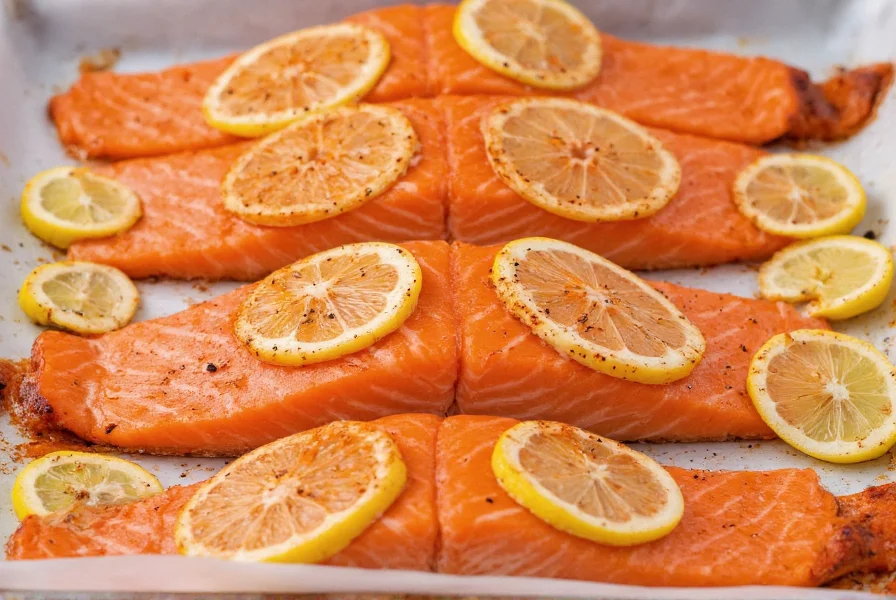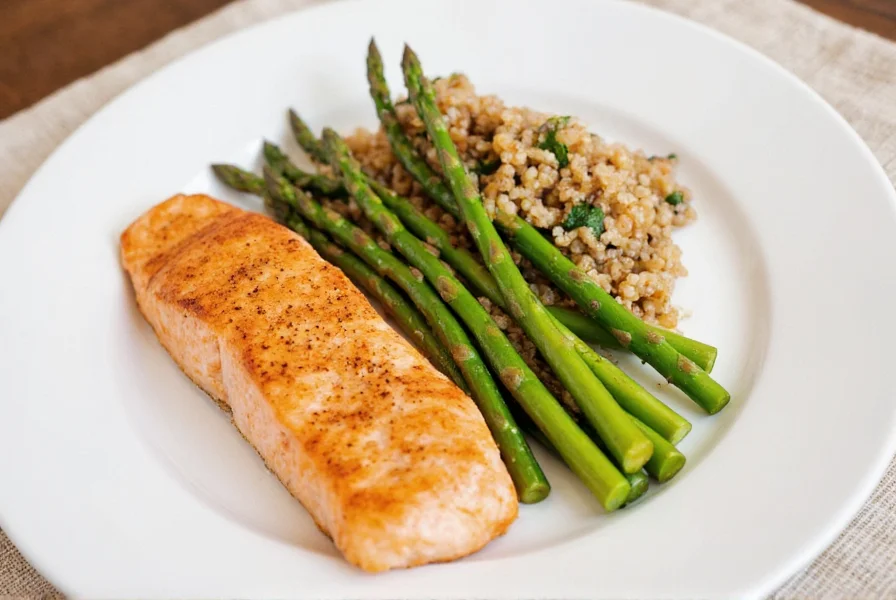Perfectly cooked lemon pepper salmon has become a staple in home kitchens for good reason—it's quick to prepare, packed with nutritional benefits, and versatile enough for weeknight dinners or special occasions. This guide provides everything you need to create restaurant-quality lemon pepper salmon in your own kitchen, whether you're a beginner cook or looking to refine your technique.
Why Lemon Pepper Complements Salmon Perfectly
The natural richness of salmon pairs beautifully with the bright acidity of lemon and the gentle warmth of black pepper. Unlike heavier spice blends, lemon pepper enhances rather than overwhelms the delicate flavor of salmon. The citric acid in lemon helps break down proteins slightly, creating a more tender texture while the pepper adds complexity without excessive heat.
Essential Ingredients for Perfect Lemon Pepper Salmon
The simplicity of this dish means ingredient quality matters. Here's what you'll need for four servings:
| Ingredient | Quantity | Why It Matters |
|---|---|---|
| Fresh salmon fillets | 4 (6 oz each) | Look for firm flesh with bright color; avoid grayish or dry edges |
| Fresh lemon | 1 large | Zest provides intense flavor; bottled zest lacks brightness |
| Freshly cracked black pepper | 1½ tbsp | Pre-ground pepper loses potency; freshly cracked delivers better flavor |
| Extra virgin olive oil | 1 tbsp | Helps seasoning adhere and prevents drying during cooking |
| Kosher salt | ¾ tsp | Enhances all flavors without making dish taste salty |
Step-by-Step Preparation Guide

1. Prepare Your Salmon
Remove pin bones using tweezers if necessary. Pat fillets completely dry with paper towels—this critical step ensures proper seasoning adhesion and prevents steaming during cooking. Place skin-side down if cooking with skin on.
2. Create the Lemon Pepper Blend
Zest one lemon (avoiding the bitter white pith), then combine with freshly cracked pepper, salt, and olive oil. For optimal flavor, let this mixture sit for 5 minutes before applying to allow the oil to absorb the citrus and pepper notes.
3. Season Properly
Evenly distribute the lemon pepper mixture across the salmon surface, gently pressing to ensure adhesion. Don't rub vigorously, which can damage the delicate flesh. For deeper flavor penetration, let seasoned salmon rest 10-15 minutes at room temperature before cooking.
4. Choose Your Cooking Method
Three excellent options exist for preparing lemon pepper salmon:
- Baking (recommended for beginners): 400°F (200°C) for 12-15 minutes
- Pan-searing: Medium-high heat for 4-5 minutes per side
- Grilling: Medium heat for 4-6 minutes per side with lid closed
Pro Tips for Perfect Results Every Time
Achieving consistently excellent lemon pepper salmon requires attention to detail. These professional techniques make the difference between good and exceptional results:
- Temperature is crucial: Invest in an instant-read thermometer; remove salmon from heat at 140°F (60°C) as it will continue cooking to the perfect 145°F (63°C) during resting
- Avoid over-seasoning: Too much pepper overwhelms the delicate salmon; too much salt draws out moisture
- Rest before serving: Let cooked salmon rest 3-5 minutes to redistribute juices
- Cook skin-side first: When pan-searing, start with skin-side down for crispier results
- Finish with fresh lemon: A final squeeze of fresh lemon juice just before serving brightens flavors
Common Mistakes to Avoid
Even simple recipes can go wrong. Steer clear of these frequent errors when preparing lemon pepper salmon:
- Using dried lemon zest instead of fresh (lacks vibrant flavor)
- Overcooking (salmon becomes dry and loses delicate texture)
- Seasoning too early with salt causing moisture loss
- Crowding the pan when searing (leads to steaming instead of searing)
- Skipping the resting period (causes juices to run out when cut)
Perfect Pairings: What to Serve with Lemon Pepper Salmon
The bright, clean flavors of lemon pepper salmon pair beautifully with these complementary sides:
- Roasted asparagus with garlic (cooks in same time as baked salmon)
- Quinoa pilaf with fresh herbs for a complete protein
- Wild rice blend for nutty flavor contrast
- Simple arugula salad with lemon vinaigrette
- Garlic sautéed green beans for crunch

Storage and Reheating Guidelines
While lemon pepper salmon tastes best fresh, you can store leftovers properly:
- Refrigeration: Store in airtight container for up to 2 days
- Reheating: Warm gently in 275°F (135°C) oven for 8-10 minutes
- Avoid microwaving: Causes uneven heating and rubbery texture
- Freezing: Not recommended as texture deteriorates significantly
Nutritional Benefits of Lemon Pepper Salmon
This dish delivers impressive health benefits beyond its delicious taste:
- Rich in omega-3 fatty acids supporting heart and brain health
- High-quality protein for muscle maintenance (about 34g per 6oz serving)
- Vitamin D (providing approximately 70% of daily needs)
- Selenium for antioxidant protection
- Low in saturated fat compared to many protein sources
Variations for Dietary Needs
Adapt this basic lemon pepper salmon recipe for various dietary requirements:
- Gluten-free: Naturally gluten-free; verify any pre-made seasoning blends
- Keto-friendly: Perfect for keto diets with zero carbohydrates
- Dairy-free: Contains no dairy ingredients
- Lower sodium: Reduce salt by half and add extra herbs like dill
- Spicier version: Add pinch of cayenne to the seasoning blend
Frequently Asked Questions
How do I know when lemon pepper salmon is done cooking?
Salmon is perfectly cooked when it reaches an internal temperature of 145°F (63°C) as measured by an instant-read thermometer. Visually, the flesh should be opaque throughout but still moist, flaking easily with a fork while maintaining some translucency in the very center. Overcooked salmon becomes dry and loses its delicate texture.
Can I use frozen salmon for lemon pepper salmon?
Yes, but thaw frozen salmon properly in the refrigerator for 24 hours before cooking. Never cook frozen salmon directly as it will cook unevenly. Pat thawed salmon extremely dry before seasoning, as frozen fish releases more moisture. For best results, use salmon frozen immediately after catch rather than previously thawed and refrozen.
What's the difference between using lemon zest versus lemon juice in lemon pepper salmon?
Lemon zest contains the flavorful citrus oils in the peel's outer layer, providing intense lemon flavor without excess liquid. Lemon juice adds necessary acidity but contains water that can dilute flavors. For optimal lemon pepper salmon, use both: zest in the seasoning blend for concentrated flavor, and a small amount of fresh juice either in the blend or as a finishing touch after cooking.
Why does my lemon pepper salmon always stick to the pan?
Salmon sticks when the pan isn't hot enough before adding fish, when the salmon isn't sufficiently dried, or when you try to move it too soon. Ensure your pan is properly preheated (a drop of water should sizzle immediately), pat salmon completely dry, and wait 2-3 minutes after placing in the pan before attempting to move it. The fish will naturally release when properly seared.
Can I prepare lemon pepper salmon ahead of time?
You can prepare the lemon pepper seasoning blend up to 24 hours ahead and store it covered in the refrigerator. Season the salmon no more than 15 minutes before cooking to prevent the salt from drawing out too much moisture. For meal prep, cook the salmon fully, then store in the refrigerator and gently reheat in a low oven when needed, though freshly cooked salmon always yields the best texture.











 浙公网安备
33010002000092号
浙公网安备
33010002000092号 浙B2-20120091-4
浙B2-20120091-4